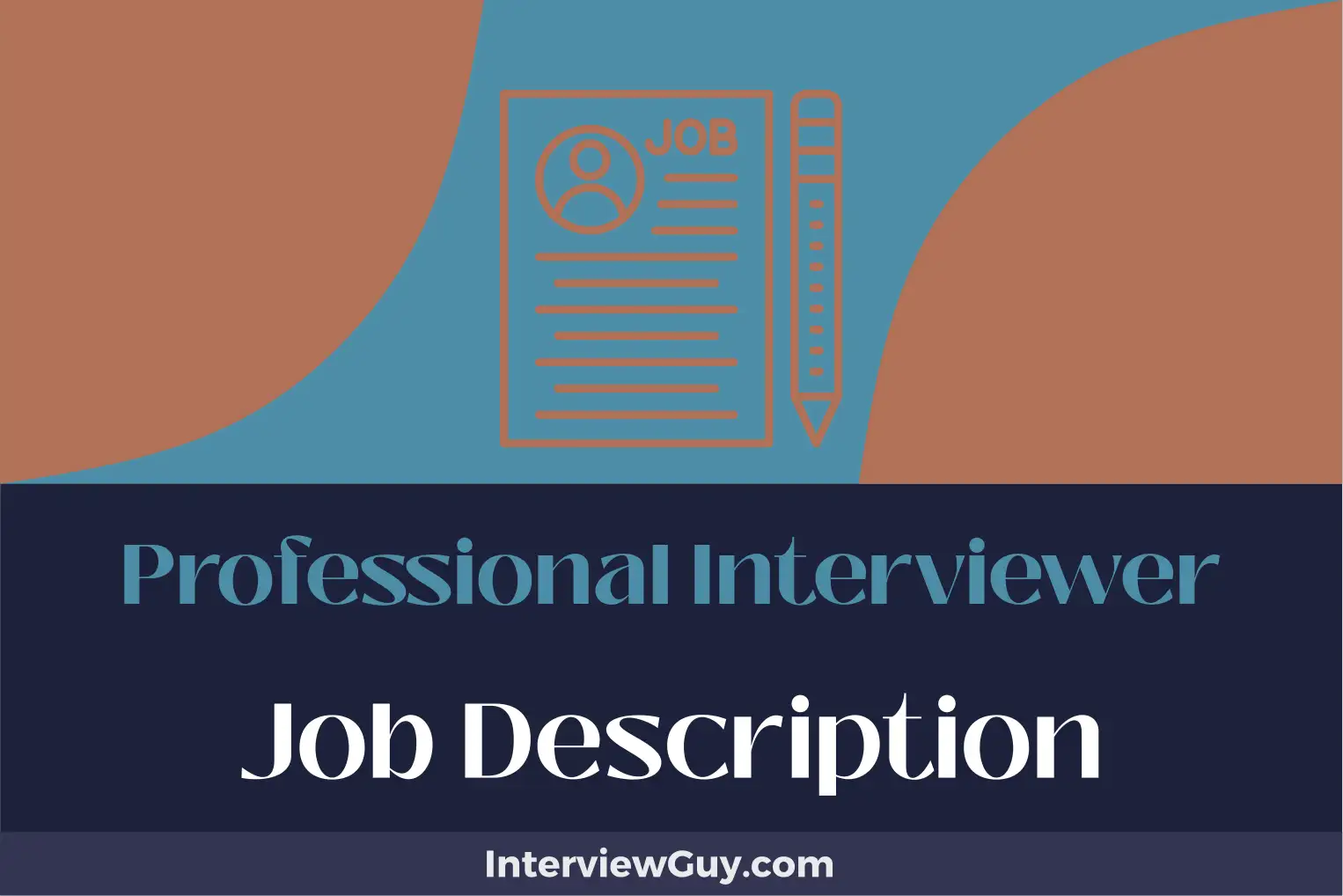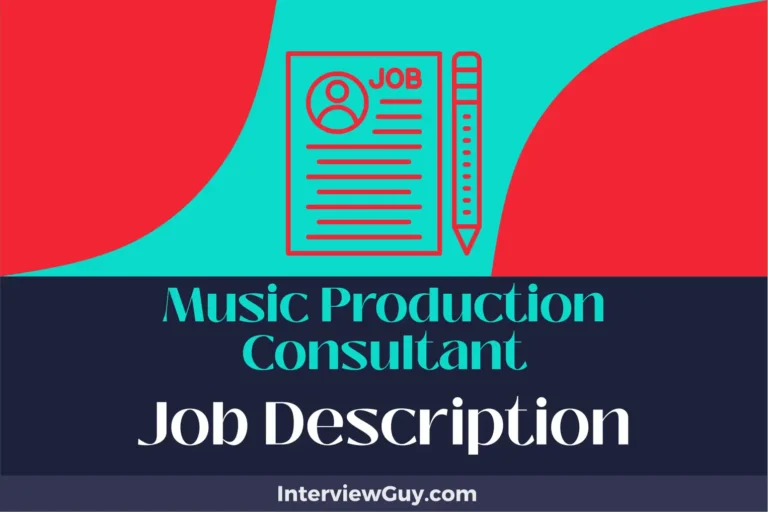Professional Interviewer Job Description [Updated for 2026]

In the modern world, the role of professional interviewers is gaining increasing significance.
As industries evolve, the demand for skilled individuals who can conduct, manage, and evaluate interviews escalates.
But let’s delve deeper: What’s truly expected from a professional interviewer?
Whether you are:
- A job seeker trying to understand the core of this role,
- A hiring manager defining the perfect candidate,
- Or simply curious about the nuances of professional interviewing,
You’ve come to the right place.
Today, we present a customizable professional interviewer job description template, tailored for easy posting on job boards or career sites.
Let’s dive right in.
Professional Interviewer Duties and Responsibilities
Professional Interviewers perform a range of tasks to effectively interview a variety of individuals.
They are often responsible for gathering and documenting information for research, business, or journalistic purposes.
The primary duties and responsibilities of a Professional Interviewer include:
- Prepare for interviews by researching topics or interviewees and preparing suitable questions
- Engage with interviewees in a professional manner and guide the conversation to ensure valuable information is obtained
- Use various communication techniques to build a rapport with interviewees
- Record interviews through various methods including notetaking, audio recording or video recording
- Ensure that the collected information is accurate and authentic
- Follow up with interviewees, if needed, to clarify any points
- Protect the confidentiality and privacy of the interviewees when necessary
- Transcribe or summarize interviews for publication or broadcast
- Provide feedback to the management or clients about the interview process and the obtained information
- Stay updated with the latest interviewing techniques, technologies and ethics.
Professional Interviewer Job Description Template
Job Brief
We are seeking a seasoned Professional Interviewer to conduct interviews for various job roles within our organization.
The role includes assessing candidates’ qualifications, understanding their career aspirations, and determining their potential fit within our team.
The ideal candidate should have excellent communication skills, a discerning eye for talent, and a deep understanding of our industry and company culture.
Ultimately, a successful Professional Interviewer will help us hire skilled professionals who will contribute to our company’s growth and success.
Responsibilities
- Conduct in-person and online interviews with prospective candidates
- Assess candidates’ skills, experience, and aptitude effectively
- Prepare and present detailed interview reports and feedback to hiring managers
- Coordinate with HR to schedule interviews
- Provide a positive and efficient interview experience for candidates
- Assist in developing and implementing effective interview strategies
- Keep abreast of industry trends and market status
- Represent the company in a professional and positive manner
Qualifications
- Proven experience as a Professional Interviewer, Recruiter, or similar role
- Excellent communication and interpersonal skills
- Strong decision-making skills
- Ability to handle multiple tasks and prioritize effectively
- Knowledge of various interview techniques and best practices
- Proficient in using HR software (like HRIS and ATS)
- Understanding of employment law and HR best practices
- BSc degree in Human Resources Management, Psychology or relevant field
Benefits
- 401(k)
- Health insurance
- Dental insurance
- Retirement plan
- Paid time off
- Professional development opportunities
Additional Information
- Job Title: Professional Interviewer
- Work Environment: Office setting with options for remote work. Some travel may be required for on-site interviews or recruiting events.
- Reporting Structure: Reports to the Hiring Manager or HR Manager.
- Salary: Salary is based upon candidate experience and qualifications, as well as market and business considerations.
- Pay Range: $55,000 minimum to $75,000 maximum
- Location: [City, State] (specify the location or indicate if remote)
- Employment Type: Full-time
- Equal Opportunity Statement: We are an equal opportunity employer and value diversity at our company. We do not discriminate on the basis of race, religion, color, national origin, gender, sexual orientation, age, marital status, veteran status, or disability status.
- Application Instructions: Please submit your resume and a cover letter outlining your qualifications and experience to [email address or application portal].
What Does a Professional Interviewer Do?
Professional Interviewers work in a variety of fields such as journalism, market research, human resources, and broadcasting.
They may work for companies, news outlets, or as independent contractors.
Their primary job is to conduct interviews, either with individuals or groups.
These interviews can be for various purposes – collecting information for news reports, conducting surveys for market research, interviewing job applicants, or hosting talk shows.
In preparation for an interview, they conduct thorough research on the interviewee or the topic at hand to formulate appropriate and probing questions.
They are also responsible for setting up the interview environment to ensure it is conducive and comfortable for the interviewee.
During the interview, they guide the conversation by asking questions and follow-up questions, listening carefully to responses, and ensuring the interview stays on track.
They are skilled in building rapport with interviewees to facilitate open and honest responses.
After the interview, they may be involved in transcribing, analyzing, and reporting the interview.
If they are journalists or talk show hosts, they may also be responsible for editing the interview footage and presenting it to an audience.
Professional Interviewers need excellent communication skills, both verbal and written, as well as strong interpersonal skills to conduct successful interviews.
They also need to have a high level of patience, empathy, and the ability to think quickly on their feet.
Professional Interviewer Qualifications and Skills
A professional interviewer should possess a range of skills and qualifications that are essential for this role:
- Excellent communication skills to articulate questions clearly and understand responses fully.
- Active listening skills to ensure they understand the information shared by the interviewee, capturing the subtleties and nuances.
- Interpersonal skills to build rapport and trust with the interviewee, making them comfortable during the interview process.
- Questioning skills to effectively gather information and delve into topics deeply.
- Empathy and sensitivity, particularly when dealing with topics that could be potentially distressing to the interviewee.
- Observation skills to notice non-verbal cues and body language which can provide extra context to the interviewee’s responses.
- Problem-solving skills to tackle any unexpected issues that may arise during the interview.
- Organizational skills to manage appointments, keep records of interviews, and follow up on any additional information required.
- Research skills to prepare for the interview by understanding the interviewee’s background and the subject matter.
- Patience and perseverance to conduct long interviews or to work with interviewees who may be uncooperative or difficult.
Professional Interviewer Experience Requirements
For the role of a professional interviewer, the experience requirements may vary depending on the specific sector or industry.
However, typically it would involve a minimum of 1-2 years experience in a relevant field, often in roles such as HR Assistant, Recruitment Coordinator, or Customer Service Representative, where communication skills and understanding of people are key.
These professionals may have gained this experience through full-time roles, internships, or even part-time positions.
It’s also beneficial if they have a background in psychology or human resources, as these fields closely relate to the skills required for an interviewer.
Candidates with more than 3 years of experience may have worked in a more focused role such as a Recruitment Specialist or HR Generalist, where they would have conducted interviews on a regular basis.
This experience also often includes understanding and implementing a company’s hiring criteria, and liaising with various department heads or hiring managers to understand the required job skills for different roles.
Those with over 5 years of experience in roles like HR Manager, Recruitment Lead, or Senior Interviewer are often ready for more complex interviewing roles.
They may have been responsible for hiring for top-level positions, conducting group interviews, or developing and refining a company’s interview process.
This extensive experience equips them with the skills to handle almost any kind of interview scenario.
Professional Interviewer Education and Training Requirements
Professional Interviewers typically have a bachelor’s degree in communication, human resources, psychology or a related field.
Courses in these programs provide valuable background in interpersonal communication, professional writing, human behavior, and public speaking.
To enhance their interviewing skills, many Professional Interviewers also complete workshops or certification programs in interviewing techniques, which may cover topics like active listening, open-ended questioning, and non-verbal communication analysis.
In some instances, particularly for those conducting specialized interviews, such as in market research or journalism, a master’s degree or additional training in the subject area may be preferred.
Professional Interviewers also often require experience in a role involving significant interaction with people, such as sales, customer service, or human resources.
Continuing education is also important in this profession as it is critical to stay updated on the latest trends in interviewing and communication strategies.
Some professional organizations offer certifications for interviewers, which can help demonstrate commitment to the profession and may enhance job prospects.
Practical experience, such as through internships or volunteer work, is also highly beneficial in this field.
Professional Interviewer Salary Expectations
A Professional Interviewer earns an average salary of $58,264 (USD) per year.
The actual earnings may fluctuate based on factors like the individual’s years of experience, level of expertise, geographical location, and the industry in which they are employed.
Professional Interviewer Job Description FAQs
What skills does a Professional Interviewer need?
A Professional Interviewer requires excellent communication and active listening skills.
They should be able to ask open-ended questions and interpret non-verbal cues.
Attention to detail, critical thinking, and the ability to remain impartial are also crucial.
Interviewers also need strong writing skills to accurately document interview findings.
Do Professional Interviewers need a degree?
While it is not strictly necessary, many Professional Interviewers have a degree in fields like psychology, human resources, communication, or sociology.
It can be beneficial as it provides a theoretical framework for understanding human behavior and communication.
However, the most important aspect is experience in conducting interviews and a deep understanding of the subject matter.
What should you look for in a Professional Interviewer resume?
Review the applicant’s interview experience, including the type of interviews conducted (behavioral, technical, etc.) and the settings (corporate, academic, etc.).
Look for evidence of strong communication skills and a high degree of emotional intelligence.
Certifications in human resources or interviewing techniques can also be beneficial.
What qualities make a good Professional Interviewer?
A good Professional Interviewer is approachable, making interviewees feel comfortable and therefore more likely to open up.
They also need to be highly observant, able to pick up on subtle cues that may indicate an interviewee’s true feelings or intentions.
Good Interviewers are also non-judgmental and unbiased, ensuring that the data collected is accurate and fair.
What are the daily duties of a Professional Interviewer?
A typical day may involve scheduling and conducting interviews, reviewing and preparing interview materials, writing up detailed interview notes, and analyzing these notes for insights.
Depending on the role, they may also be responsible for creating interview protocols, training other interviewers, and presenting their findings to key stakeholders.
Conclusion
So there you have it.
Today, we shined a light on what it truly means to be a professional interviewer.
And guess what?
It’s not just about asking questions.
It’s about uncovering the stories, insights, and motivations behind every response.
With our go-to professional interviewer job description template and real-world examples, you’re all geared up to take your career forward.
But why stop there?
Dig deeper with our job description generator. It’s your essential tool for creating precision-crafted job listings or refining your resume to perfection.
Remember:
Every question asked is a pathway to deeper understanding.
Let’s uncover those stories. Together.





![Forensic Computer Examiner Job Description [Updated for 2026]](https://interviewguy.com/wp-content/uploads/2024/07/forensic-computer-examiner-job-description-768x512.webp)
